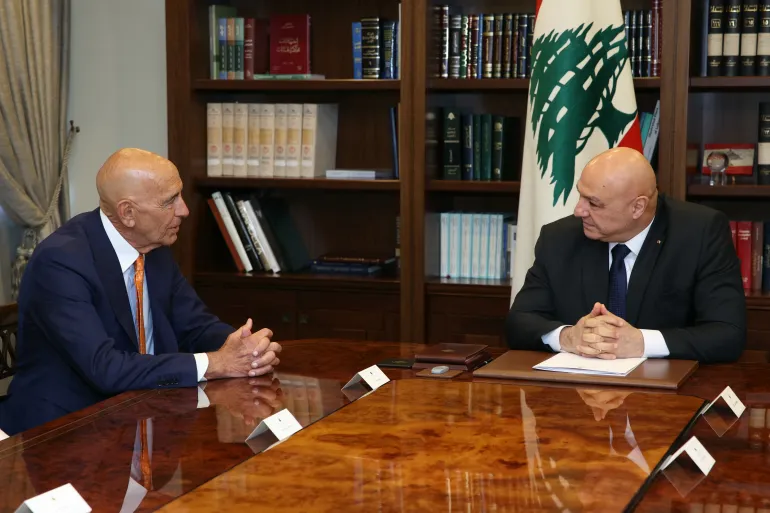Lebanon responds to US framework for Israel-Lebanon ceasefire

US envoy Tom Barrack on July 7th arrived in Beirut to open a “diplomatic window” aimed at de-escalating tensions between Israel and Lebanon.
According to Asharq al-Awsat, Lebanese officials submitted a response to a US-backed framework to end hostilities, a proposal that includes the potential disarmament of Hezbollah.
Barrack’s visit followed a spike in Israeli military activity along the border, widely perceived in Lebanon as a warning: accept the US-brokered framework or risk an expanded conflict.
Lebanese officials told Asharq al-Awsat that Barrack applauded Lebanon’s openness and thoughtful engagement with the initiative. He is reportedly working on drafting a formal US response through the embassy in Beirut, with plans to possibly return to Lebanon within two weeks if progress continues as anticipated.
The official Lebanese response, issued on behalf of President Michel Aoun, Speaker Nabih Berri, and Prime Minister Nawaf Salam, did not reflect Hezbollah’s position.
The group reportedly declined to participate in the presidential committee responsible for drafting the response. However, Speaker Berri separately submitted a response representing the Shiite political alliance, including his Amal Movement and Hezbollah.
Berri stressed the necessity of a firm, enforceable ceasefire commitment from Israel, citing repeated violations during the recent escalation. Barrack acknowledged these concerns, noting that the ceasefire agreement, which paused cross-border fighting in November 2024, lacked proper enforcement mechanisms.
He pointed out the absence of a US guarantor in the previous deal and emphasised that the current talks aim to close such loopholes. Prime Minister Salam echoed these remarks, stating that Barrack had brought with him “new arrangements to halt hostilities.”
During the 90-minute meeting with President Aoun, also attended by the US ambassador to Lebanon and senior officials, Barrack received Lebanon’s formal proposals. In a statement issued afterwards, the presidency described the submission as “comprehensive ideas for a solution.”
“What the government gave us was something spectacular in a very short period of time,” Barrack said to reporters after meeting with Aoun. “I’m unbelievably satisfied with the response,” he added, highlighting the importance of this opportunity for peace and reconstruction, provided that both sides are willing to make some compromises.
On the question of Hezbollah’s disarmament, Barrack clarified that the US has no intention of engaging directly with the group. He stressed that this issue must be handled internally by Lebanese authorities. Additionally, he dismissed claims that the US was seeking regime change in Lebanon or attempting to reshape its sectarian political system, insisting that meaningful reform must come from within.
Addressing criticism of the US role in enforcing the previous ceasefire, Barrack rejected accusations of failure, attributing the breakdown to the absence of a credible security guarantor. He noted that the Lebanese government is now working to address those shortcomings as part of the new diplomatic push.
He also connected the ongoing negotiations to broader international initiatives, including International Monetary Fund-backed reforms and Lebanese cabinet policies, indicating that reconstruction in southern Lebanon forms one piece of a wider diplomatic puzzle.
Reflecting on the prospects for future Lebanon-Israel relations, Barrack struck a cautiously hopeful tone. “I believe Lebanon and Israel are ultimately seeking the same thing. Israel does not want war with Lebanon, nor does it wish to occupy Lebanon,” he said.
Concluding his remarks, Barrack reiterated the limits of Washington’s role: “America cannot provide all the answers. We can only assist from the outside. The real solutions must come from within.”
Asharq al-Awsat, Maghrebi.org
Want to chase the pulse of North Africa?
Subscribe to receive our FREE weekly PDF magazine














